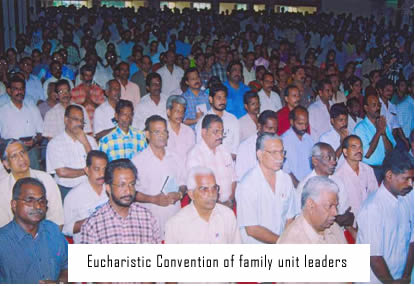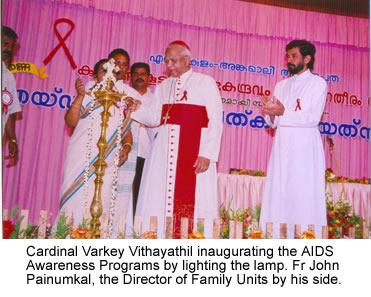Family Units in India – Indigenous Small Christian Communities

1. A Short History
When we talk of Small Christian Communities our thoughts turn to the Basic Christian Communities that started in Latin America in 1950s and 60s. In the context of the harsh realities of economic injustice and repressive regimes, these  communities opened up new possibilities for the people there. Inspired by these, Small Christian Communities sprang up all over the world. The history of Family Units in India goes back even farther. In the early part of 1940s a visionary archbishop named Augustine Kandathil of the archdiocese of Ernakulam urged his priests and lay leadership through a pastoral letter to form wards or units of families in parishes in order to organize different activities at the grass-root level, like rosary prayer, parish festival celebration, etc. The idea was well conceived but no serious effort was made to establish such units in those decades.
communities opened up new possibilities for the people there. Inspired by these, Small Christian Communities sprang up all over the world. The history of Family Units in India goes back even farther. In the early part of 1940s a visionary archbishop named Augustine Kandathil of the archdiocese of Ernakulam urged his priests and lay leadership through a pastoral letter to form wards or units of families in parishes in order to organize different activities at the grass-root level, like rosary prayer, parish festival celebration, etc. The idea was well conceived but no serious effort was made to establish such units in those decades.
In 1974 the concept evolved into “Parish Family Units” in the parish of St. Mary’s Cathedral Basilica of Ernakulam. It was the first of its kind in the church at that time. The units were not copies of the Basic Christian Communities in Latin America. They were formed in response to a felt need in the area. The primary intent was to bring together the Christian families that were increasingly being isolated and alienated by the onslaught of industrialization and urbanization. 20 to 30 families gathered together in one of their homes once a month, at the time of the family prayer in the evening. They read the scriptures, sang hymns and prayed together; the group shared the news in the neighborhood and discussed ways of reaching out to one another in case of needs. Each unit had its own leadership who organized the meetings and monitored other activities. The parish priest or someone designated by him acted as a facilitator or animator at the gatherings. These were well received by the people and soon the entire parish was restructured into family units. Msgr. Joseph Thaliath, the parish priest of the Cathedral at that time deserves special mention here as a real pioneer in this direction.
The family units spread into other parishes fast because of the opportunities of togetherness and renewal they provided. In the span of the last thirty years family units have grown beyond the limits of the archdiocese and the state. There are family units in almost all the dioceses in Kerala state and beyond. Other religious communities like the Hindus have found them meaningful and copied some of the organizational aspects.
In the Archdiocese of Ernakulam a Department of Family Units was established in 1998. A priest director along with necessary staff is at the office, situated in the pastoral center of the archdiocese. The motto of family units is spelt out as “Together in Love, together in God.” There are about 3,000 family units in the Archdiocese involving nearly 100,000 families.
2 The Meetings
Every month the unit members come together in one of their family homes. The meeting would begin with prayer and a welcome by the head of the family. The chairperson and the secretary will present the minutes from the previous meeting and set a tone and direction for the day’s deliberations. Then, there will be the solemn enthronement of the Holy Bible, reading from it, silent reflection, sharing and prayer by individuals. Singing of chants is an important element of that prayer session .Usually the priest or the facilitator will conclude that session with a brief reflection and prayer. The general session that follows will focus on events in the families like birthdays, achievements etc. General discussions about the parish events and some cultural performances by the children are integral to this general session. Some units include Bible quizzes both for adults and children. A cup of tea or coffee with light refreshments will be a part of the evening.
3 Involvement in the Parish and diocese

Usually the whole parish is divided into neighborhood family units so much so the activities of the parish are better coordinated through these units. Representatives to the Parish Pastoral Council are sometimes elected from these units. At the diocesan and parish levels there are workshops for the family unit leaders for leadership training and group dynamics skills. Under the auspices of the central office of family units workshops in different parishes for lay leadership training have been very successful The leaders of family units meet together at the parish and diocesan levels to discuss and implement different enrichment programs. Conventions in which the family unit leaders come together are regular at these levels.
4 Adult Catechesis
The setting of family units meetings is effectively utilized for adult catechesis. A bimonthly publication called Koottayma virunnu (‘Banquet of unity’) from the central office reaches all the members of the family units with information and possible topics for discussions in the gatherings regarding family life, faith formation, sacraments etc.
5 HIV/AIDS Awareness Programs
Awareness programs on HIV and AIDS is another felt need in the area and family units are deeply involved in these. Family units are able to help to provide counseling services for those infected and for their family members. More than 500 thousand people have been directly contacted by volunteers from family units in order to educate them of the different aspects of the disease. 
The Department of Family Units in the Archdiocese of Ernakulam is actively involved in supporting the family units all through the parishes in this part of the world. Almost every family belongs to a unit and it is the way of being Church.
The family units continue to enrich the faith life of the people and strengthen the bonds among families. Most families look forward to the opportunity of these gatherings with great anticipation. These have been a great blessing for the church in those areas where they are strong. The pastors find them helpful in the governance of the parish affairs as well. Every unit is truly the Church in miniature.
Fr Xavier Thelakkatt
PO Box 45,
Rush City, MN 55069
